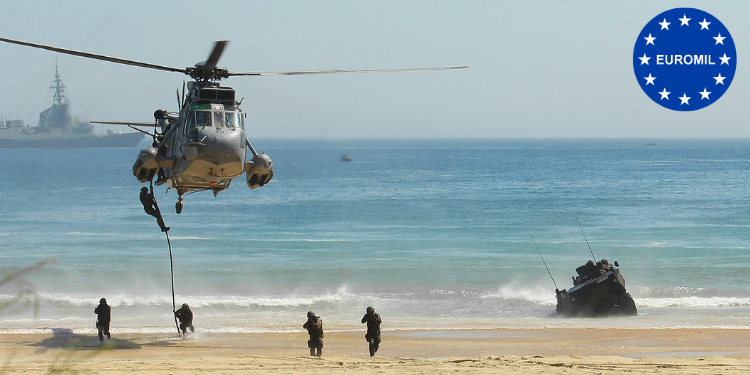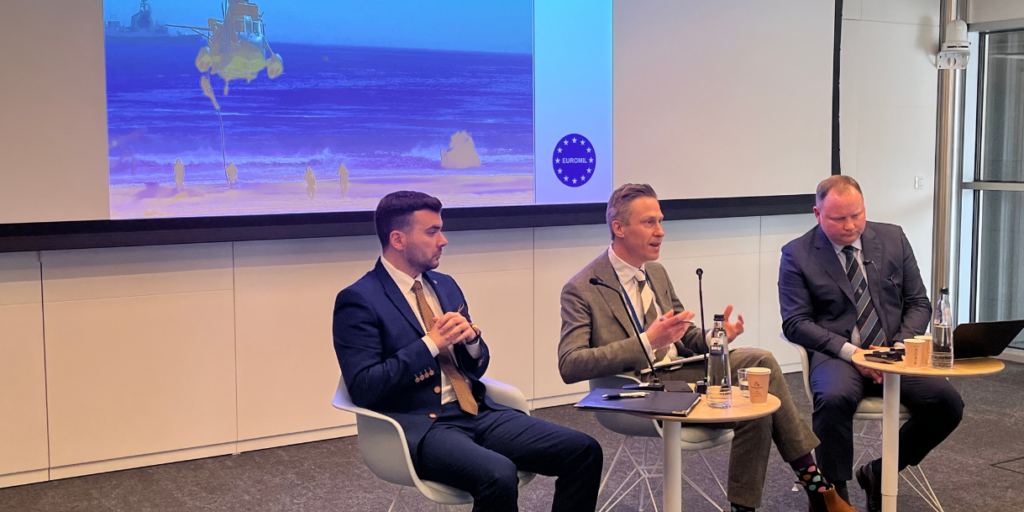Event: How will the European Elections Influence the Common Security and Defence Policy (CSDP)
EUROMIL in cooperation with together.eu organised on the 20th of March a two panel event discussions to address and analyse how the current geopolitical environment has affected European defence, as well as the fact that the European elections come at a pivotal moment for the future of CSDP.
At the beginning of the event, Olivia Serra (Officer responsible for Communication and Institutional campaigns – DG COMM European Parliament) presented together.eu and the actions that they have been taken to engage citizens amid the upcoming European Elections.
During the opening remarks, the President of EUROMIL, Emmanuel Jacob highlighted that the European Elections come at a pivotal time for Europe given the changed geopolitical environment. While briefly presenting important initiatives that the EU has been taking the past year to enhance its security and defence capacities, he emphasized on the Rapid Deployment Capacity (RDC) and most importantly on the fact that EUROMIL supports that soldiers who train and work together under a European framework as the RDC should also enjoy a minimum of social and working rights.
Emmanuel Jacob also informed the participants about EUROMIL’s European Elections project and concluded that the time is now to move towards implementation but without forgetting the men and women that make all these policies a reality. 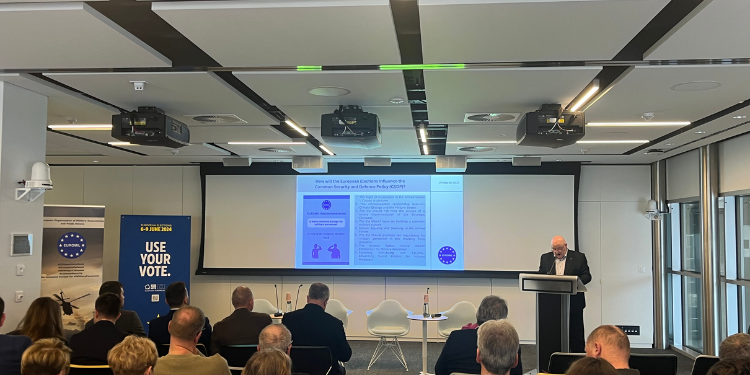
At the first panel discussion the speakers emphasized on the future of the EU’s Common Security and Defence Policy (CSDP), the war in Ukraine, and the next steps after the elections. More precisely, the moderator, Roger Housen (ACMP – CGPM and member of EUROMIL) highlighted that both the European Elections, as well as the US Presidential elections in November 2024 will play a crucial role on the current geopolitical stage. Europe is facing multiple challenges that need to be addressed to build up its military capabilities and Member States should be on the same page without debating about EU’s strategic autonomy.
In this regard, MEP Michael Gahler stressed that there is an urgent need to step up our defence efforts and strengthen the European pillar in NATO. Besides, standardisation on the military and not only on regarding the industry – was deemed as essential to foster interoperability. According to MEP Gahler, it is high time to use the existing treaty on its full potential and do more on security and defence.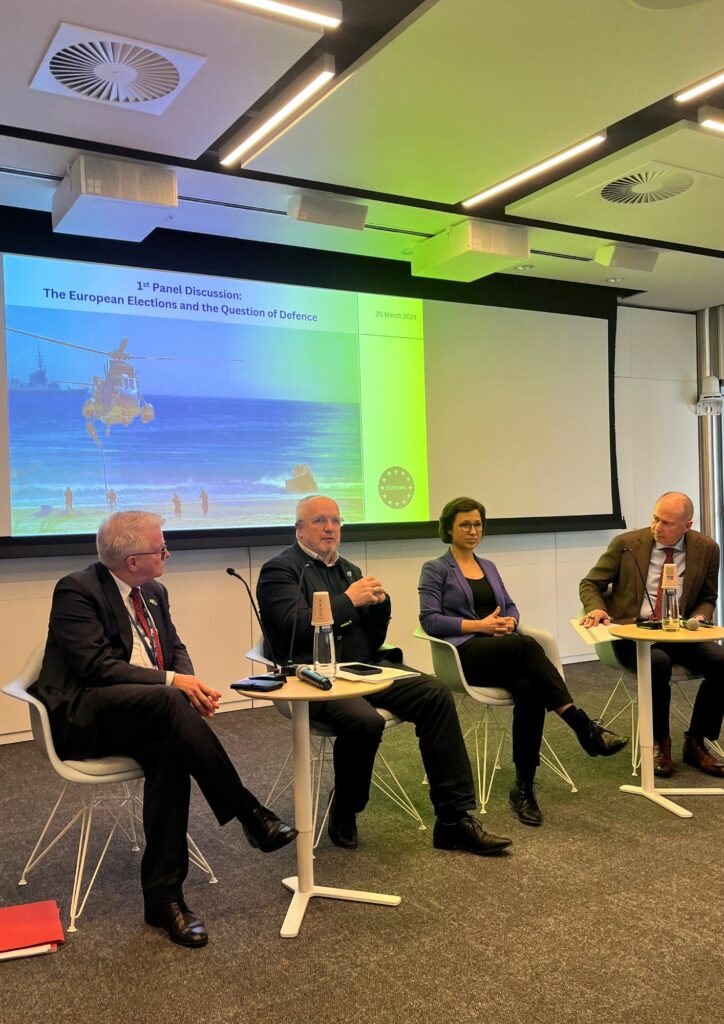
On the Rapid Deployment Capacity the participants stated that these 5000 troops should be permanent stationed but it is not really a capacity rather a military support. However, it represents a first essential step to move forward.
Moreover, MEP Juozas Olekas emphasized on the need for the Member States to have a common perception of threats, and only by understanding the size of threats we can act together. MEP Hannah Neumann stated that the green transition should go hand in hand with defence, while the next steps should focus on the joint procurement, identifying capability gaps through tools as CARD and making NATO standards binding. Overall, commitment and implementation are the necessary elements for the EU to enhance its CSDP.
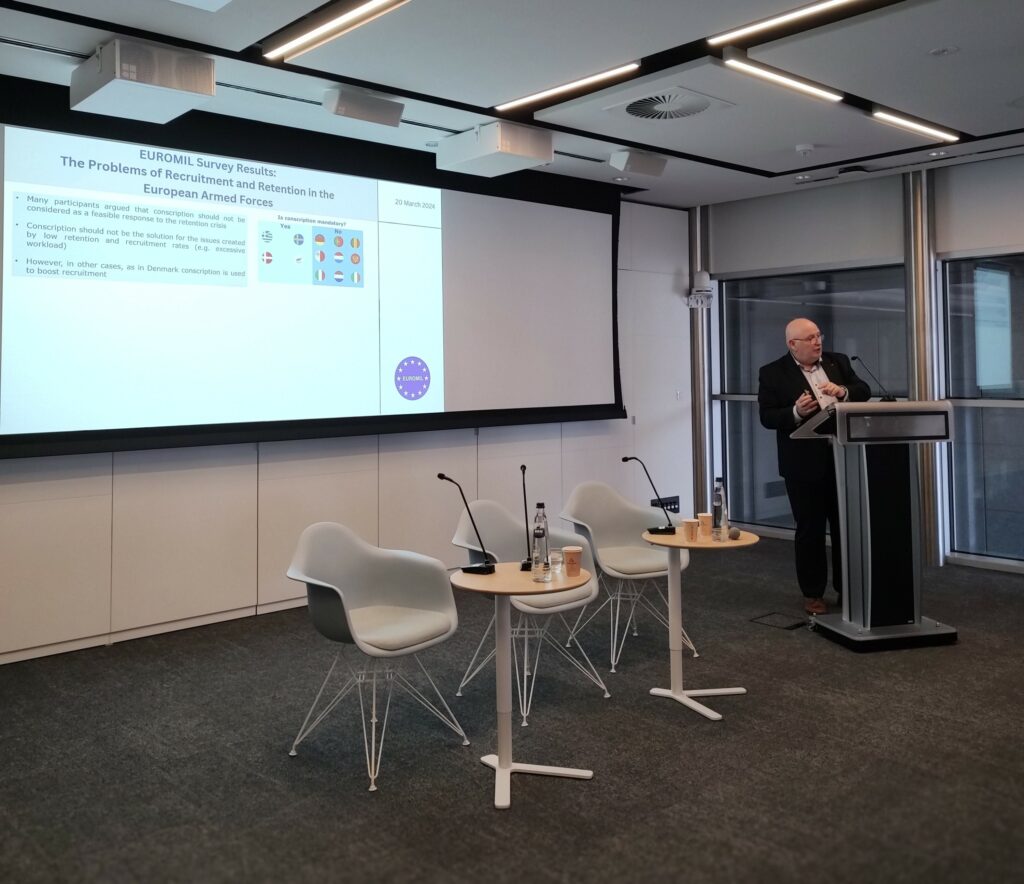 The second panel discussion focused on issues that the European Armed Forces have to face, as the low recruitment and retention rates. EUROMIL also launched its report on the issue. In details, EUROMIL has launched a survey entitled “The problems of recruitment and retention in the European Armed Forces”, whereas members associations and trade unions provided a comprehensive overview of the matter. EUROMIL’s President presented the main results of the report to the participants and the second panel discussion elaborated more on this issue.
The second panel discussion focused on issues that the European Armed Forces have to face, as the low recruitment and retention rates. EUROMIL also launched its report on the issue. In details, EUROMIL has launched a survey entitled “The problems of recruitment and retention in the European Armed Forces”, whereas members associations and trade unions provided a comprehensive overview of the matter. EUROMIL’s President presented the main results of the report to the participants and the second panel discussion elaborated more on this issue.
Firstly, the moderator, Derek Priestley, Deputy General Secretary of the Representative Association of Commissioned Officers (RACO), member of EUROMIL- presented its organisation survey on the matter, which highlights once more that the Armed Forces are suffering from low recruitment and retention rates. Attractive job opportunities from the private sector, social and working conditions, military mentality vs mentality of the younger generations are the primary reasons behind the problem.
Regarding the role of the EU on security and defence, Stijn Mols, Head of Division Security and Defence Policy, European External Action Service (EEAS), underlined that unprecedented actions have taken place the past year and have created the necessary frameworks and incentives for greater cooperation. However, one issue the also needs to be addressed is efficient communication with the citizens. On recruitment and retention, he stated that it is not only essential for the Armed Forces but also for building industrial capacity since expertise was lost due to the years of underinvestment.
George Zgardanas, Board Member of EUROMIL and member of PFEARFU, also underlined the need to boost recruitment and retention at a national level, provide the necessary working and social conditions for personnel and attract younger people. On the issue of conscription he also stated that it cannot be used as a solution to low recruitment and retention rates.
To summarize, the participants stressed that at an EU level initiatives and policies are providing the necessary tools to address current challenges, however, Member States are the ones that need to make full use of such tools. Lastly, the President of EUROMIL underscored once again that the main driver for defence and security are the men and women in uniform.

